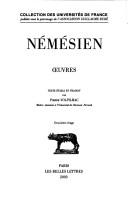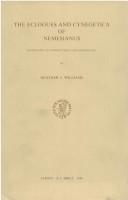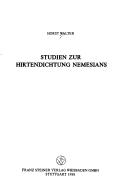| Listing 1 - 10 of 10 |
Sort by
|
Book
Year: 1969 Publisher: Hildesheim : G. Olms,
Abstract | Keywords | Export | Availability | Bookmark
 Loading...
Loading...Choose an application
- Reference Manager
- EndNote
- RefWorks (Direct export to RefWorks)
Book
ISBN: 9783110265996 Year: 2014 Publisher: Berlin ; New York Walter de Gruyter
Abstract | Keywords | Export | Availability | Bookmark
 Loading...
Loading...Choose an application
- Reference Manager
- EndNote
- RefWorks (Direct export to RefWorks)
Hunting --- Chasse --- Poetry --- Poésie --- Nemesianus, Marcus Aurelius Olympius.
Book
ISBN: 311026692X 1306205301 3110265990 9783110266924 9783110265996 Year: 2014 Publisher: Berlin
Abstract | Keywords | Export | Availability | Bookmark
 Loading...
Loading...Choose an application
- Reference Manager
- EndNote
- RefWorks (Direct export to RefWorks)
Nemesians Lehrgedicht über die Jagd, 283/84 n. Chr. in Nordafrika entstanden und den Kaisern Carinus und Numerian gewidmet, orientiert sich in Aufbau und Konzeption an Vergils Georgica, dem klassischen Gattungsmodell; in der Auffasssung von der Jagd als einem gefahrlosen Freizeitsport bietet das Werk einen unheroischen Gegenentwurf zu früheren Jagdgedichten. Die hier vorgelegte kritische Neuedition beruht auf einer in situ vorgenommenen Aufnahme aller Handschriften. Der ausführliche Kommentar erörtert alle philologischen Detailprobleme (Sprache, Metrik, Textherstellung) sowie die Realien des antiken Jagdwesens. Berücksichtigung finden aber auch übergeordnete Fragen wie das Verhältnis zur kynegetischen Fachliteratur, gattungsreferenzielle Aspekte und das dichterische Selbstverständnis des Autors.
Ancient Didactic Poetry. --- Antike Lehrdichtung. --- Cynegetic Literature. --- Cynegetika. --- Nemesian. --- Nemesianus. --- Nemesianus, Marcus Aurelius Olympius.
Book
ISBN: 9004669248 Year: 1974 Publisher: Leiden : Brill,
Abstract | Keywords | Export | Availability | Bookmark
 Loading...
Loading...Choose an application
- Reference Manager
- EndNote
- RefWorks (Direct export to RefWorks)
Pastoral poetry, Latin --- Country life in literature. --- History and criticism. --- Nemesianus, Marcus Aurelius Olympius --- Criticism and interpretation. --- Rome --- In literature.

ISBN: 225101117X Year: 2003 Publisher: Paris : Belles Lettres,
Abstract | Keywords | Export | Availability | Bookmark
 Loading...
Loading...Choose an application
- Reference Manager
- EndNote
- RefWorks (Direct export to RefWorks)
Poésie pastorale latine --- Pastoral poetry, Latin. --- Nemesianus, Marcus Aurelius Olympius --- Pastoral poetry, Latin --- Country life --- Hunting --- Translations into French. --- Poetry --- Poetry. --- Poésie pastorale latine.
Book
Year: 1975 Publisher: Paris : Belles Lettres,
Abstract | Keywords | Export | Availability | Bookmark
 Loading...
Loading...Choose an application
- Reference Manager
- EndNote
- RefWorks (Direct export to RefWorks)
Pastoral poetry, Latin --- Country life --- Pastoral poetry, Latin. --- Hunting --- Translations into French. --- Poetry. --- Poetry. --- Nemesianus, Marcus Aurelius Olympius --- Translations into French.

ISBN: 9004074864 9004328238 9789004074866 Year: 1986 Volume: 88 Publisher: Leiden Brill
Abstract | Keywords | Export | Availability | Bookmark
 Loading...
Loading...Choose an application
- Reference Manager
- EndNote
- RefWorks (Direct export to RefWorks)
Although editions of Nemesianus have been surprisingly numerous, very few have contributed appreciably to our understanding of this author, and most texts have been based on a very limited number of manuscripts. There has been no commentary of any length since that of Burman (1731) and there has never before been one in English covering the whole corpus. This book is an attempt to remedy those deficiencies. The text is the first to have been based on an examination of all the known manuscripts, and a detailed and accurate apparatus criticus is provided. The textual history of both poems is thoroughly discussed. The question of the authenticity of the Eclogues is examined and Nemesianus' authorship is held to be proved. The commentary is mainly concerned with textual and grammatical matters. There is also a bibliography.
Classical Latin literature --- Pastoral poetry, Latin --- Hunting --- Hunting in literature. --- Hunting. --- Literature. --- Manuscripts, Latin. --- Pastoral poetry, Latin. --- Latin pastoral poetry --- Latin poetry --- Latin manuscripts --- Latin language --- Latin philology --- Belles-lettres --- Western literature (Western countries) --- World literature --- Philology --- Authors --- Authorship --- Chase, The --- Field sports --- Gunning --- Harvesting (Hunting) --- Hunting for sport --- Hunting, Primitive --- Recreational hunting --- Sport hunting --- Wildlife-related recreation --- Safaris --- Trapping --- Criticism, Textual. --- Nemesianus, Marcus Aurelius Olympius --- Nemesianus, Marcus Aurelius Olympius. --- Nemesianus --- Nemesian --- Nemesiano --- Nemesiano, Marco Aurelio Olimpio --- Manuscripts. --- Knowledge --- Rome --- Rome (Empire) --- Rim --- Roman Empire --- Roman Republic --- Romi (Empire) --- Byzantine Empire --- Italy --- In literature.

ISBN: 9004038604 Year: 1974 Publisher: Leiden Brill
Abstract | Keywords | Export | Availability | Bookmark
 Loading...
Loading...Choose an application
- Reference Manager
- EndNote
- RefWorks (Direct export to RefWorks)
Pastoral poetry, Latin --- -Rome in literature --- Country life in literature --- Latin pastoral poetry --- Latin poetry --- History and criticism --- Nemesianus, Marcus Aurelius Olympius --- -Nemesianus --- Nemesian --- Nemesiano --- Nemesiano, Marco Aurelio Olimpio --- Criticism and interpretation --- Country life in literature. --- History and criticism. --- Criticism and interpretation. --- Rome --- In literature. --- -Criticism and interpretation --- Nemesianus

ISBN: 3515051104 9783515051101 Year: 1988 Volume: 26 Publisher: Wiesbaden Steiner
Abstract | Keywords | Export | Availability | Bookmark
 Loading...
Loading...Choose an application
- Reference Manager
- EndNote
- RefWorks (Direct export to RefWorks)
Pastoral poetry, Latin --- Poésie pastorale latine --- History and criticism --- Histoire et critique --- Nemesianus, Marcus Aurelius Olympius --- Criticism and interpretation --- Critique et interprétation --- History and criticism. --- -Rome in literature --- Latin pastoral poetry --- Latin poetry --- -Nemesianus --- Nemesian --- Nemesiano --- Nemesiano, Marco Aurelio Olimpio --- Rome in literature. --- Criticism and interpretation. --- -Criticism and interpretation --- Poésie pastorale latine --- Critique et interprétation --- Nemesianus --- Rome --- In literature. --- Pastoral poetry, Latin - History and criticism.
Book
ISBN: 9783515128438 9783515128469 3515128468 3515128433 Year: 2021 Volume: 124 Publisher: Stuttgart : Franz Steiner Verlag,
Abstract | Keywords | Export | Availability | Bookmark
 Loading...
Loading...Choose an application
- Reference Manager
- EndNote
- RefWorks (Direct export to RefWorks)
Calpurnius Siculus verfasste Ende der 50er Jahre n. Chr. ein Gedichtbuch aus sieben Eklogen, um den jungen Kaiser Nero zu preisen. In der 1. Ekloge finden Hirten eine Bauminschrift des Faunus: Der ländliche Gott verheißt eine Goldene Zeit, da Nero den Thron besteigen wird, den der Dichter als Retter aus der Bürgerkriegsgefahr und als einen besseren Augustus stilisiert.Von den Gedichten sind in den letzten Jahren alle Stücke in Einzelkommentaren erschlossen worden – mit Ausnahme der programmatischen 1. Ekloge, in der sich Calpurnius als poetologischer Erbe nicht nur des ersten römischen Bukolikers Vergil, sondern der gesamten augusteischen Dichtung zu erkennen gibt. Dieses Desiderat liefert nun Anne-Elisabeth Beron: Neben einer umfassenden Einleitung zu Leben und Werk des Dichters bietet der Band einen detaillierten philologischen Kommentar sowie eine Edition mit deutscher Übersetzung. Erstmals in der Forschungsgeschichte finden dabei Glossen aus sämtlichen Handschriften zur 1. Ekloge in einem eigenen Apparat Platz.
E-books
---
Ekloge
---
Kommentar
---
Calpurnius Siculus, Titus
---
Heidelberg
---
(Produktform)Electronic book text
---
Augustus
---
Bauminschrift
---
Bukolik
---
Calpurnius Siculus
---
Edition
---
Faunus
---
Glossen
---
Goldene Zeit
---
Herrscherlob
---
Hirtendichtung
---
Imitation Vergils
---
Nachahmung Vergils
---
Nachfolge Vergils
---
Nero
---
Niccolò degli Angeli
---
Nicolaus Angelius
---
Panegyrik
---
Prinzipat
---
Riccardianus 636
---
Theokrit
---
Vergil
---
aemulatio Vergils
---
aurea aetas
---
römische Kaiserzeit
---
(VLB-WN)9567
---
Kommentare
---
Kommentierung
---
Calpurnius
---
Titus Calpurnius Siculus
---
Calpurnius, Titus Iulius
---
Iulius
---
Siculus, Calpurnius
---
Siculus, Titus Calpurnius
---
Siculus, Titus
---
Calphurnius, Titus Iulius
---
Julius
---
Titus Iulius
---
Titus Julius
---
Calpurnius Siculus, Titus Iulius
---
Calphurnius Siculus, Titus
---
Calphurnius
---
Siculus, Titus Iulius
---
Calpurnius, Titus Julius
---
Calpurnio
---
Calpurnius, Titus
---
Calpurnio Siculo, T.
---
Calphurnius Siculus, Titus C.
---
Kalpurnius
---
Calpurnius Siculus, Lucius
---
Calpurnius Siculus, Gaius
---
Pseudo-Calpurnius
---
Siculo, Tito C.
---
Calpurnius C. Siculus
---
Calpurnius Siculus, Caius Titus Julius
---
Calphurnius, Caius
---
Calphurnius, Titus
---
Schriftsteller
---
Brassicanus, Johannes Alexander
---
Gratius Faliscus
---
Logau, Georg <
| Listing 1 - 10 of 10 |
Sort by
|

 Search
Search Feedback
Feedback About UniCat
About UniCat  Help
Help News
News